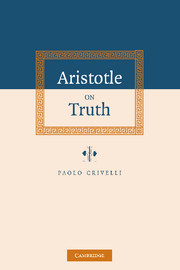Book contents
- Frontmatter
- Contents
- Acknowledgements
- Notes on the text
- List of abbreviations of titles of Aristotle's works
- Introduction
- Part I BEARERS OF TRUTH OR FALSEHOOD
- Part II ‘EMPTY’ TERMS
- Chapter 4 Truth as correspondence
- Chapter 5 ‘Vacuous’ terms and ‘empty’ terms
- Part III TRUTH AND TIME
- Appendix 1 Metaph. Θ 10, 1051b1: the text
- Appendix 2 Metaph. Θ 10, 1051b2–3: the text
- Appendix 3 Int. 7, 17b16–18: the text
- Appendix 4 The two-place relations in Aristotle's definition of truth
- Appendix 5 Aristotle's theory of truth for predicative assertions: formal presentation
- Appendix 6 The failure of bivalence for future-tense assertions: formal presentation
- References
- Index of names
- Index of subjects
- Index of passages
Chapter 5 - ‘Vacuous’ terms and ‘empty’ terms
Published online by Cambridge University Press: 22 September 2009
- Frontmatter
- Contents
- Acknowledgements
- Notes on the text
- List of abbreviations of titles of Aristotle's works
- Introduction
- Part I BEARERS OF TRUTH OR FALSEHOOD
- Part II ‘EMPTY’ TERMS
- Chapter 4 Truth as correspondence
- Chapter 5 ‘Vacuous’ terms and ‘empty’ terms
- Part III TRUTH AND TIME
- Appendix 1 Metaph. Θ 10, 1051b1: the text
- Appendix 2 Metaph. Θ 10, 1051b2–3: the text
- Appendix 3 Int. 7, 17b16–18: the text
- Appendix 4 The two-place relations in Aristotle's definition of truth
- Appendix 5 Aristotle's theory of truth for predicative assertions: formal presentation
- Appendix 6 The failure of bivalence for future-tense assertions: formal presentation
- References
- Index of names
- Index of subjects
- Index of passages
Summary
As we saw in chapter 4, Aristotle's theory of truth for assertions can be regarded as a correspondence-as-isomorphism theory of truth: Aristotle takes an assertion's truth to consist in a certain isomorphism obtaining between the assertion and reality. We also saw that Aristotle's correspondence-as-isomorphism theory of truth presents itself in two formats. In the first, the components of reality with respect to which a true assertion's isomorphism holds are objects that correspond to assertions as wholes (one object corresponding to one complete assertion). In the second format, which concerns mainly predicative assertions, the components of reality with respect to which a true predicative assertion's isomorphism holds correspond to parts of the assertion: they are objects, i.e. universals or individuals, signified by the assertion's predicate and subject. A well-known difficulty faced by correspondence-as-isomorphism theories of truth of the second format is the problem of ‘vacuous’ terms. What happens if either the subject or the predicate of an assertion is ‘vacuous’, i.e. fails to signify an item of the appropriate kind? A correspondence-as-isomorphism theory of truth of the second format loses one of its toeholds.
Section 1 contains four arguments for the thesis that Aristotle's reply to the problem of ‘vacuous’ terms is that in every predicative assertion both the predicate and the subject are ‘non-vacuous’ in that they signify items of the appropriate kinds.
Information
- Type
- Chapter
- Information
- Aristotle on Truth , pp. 152 - 180Publisher: Cambridge University PressPrint publication year: 2004
